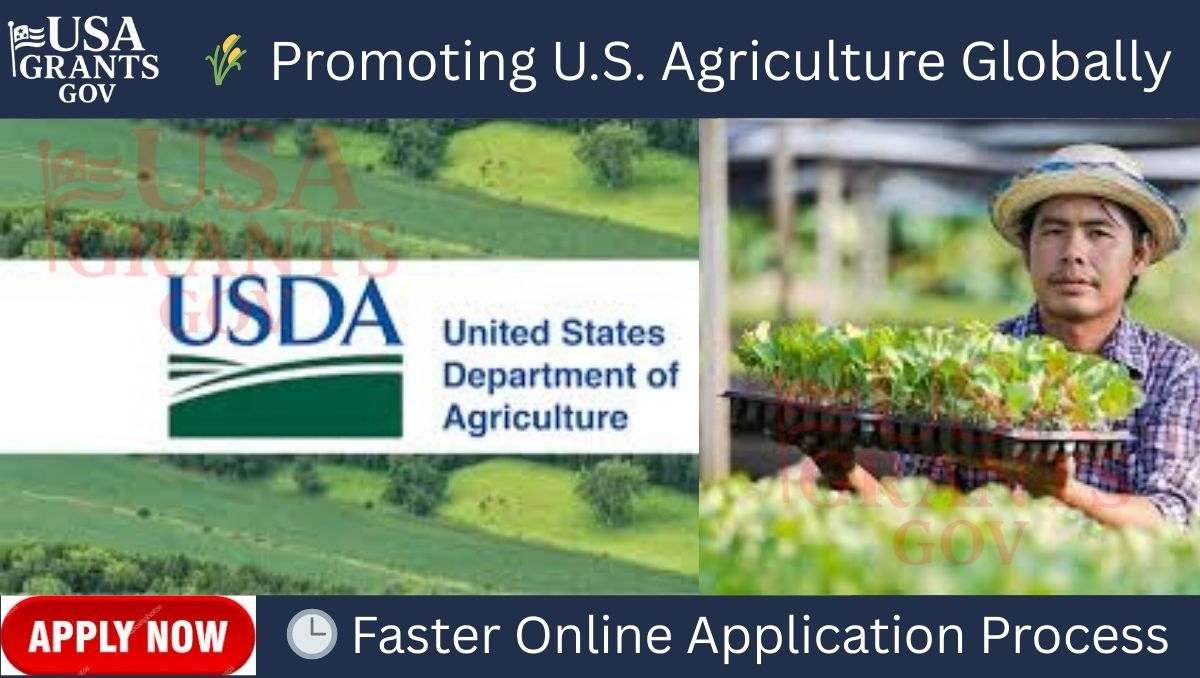Quality Samples Program (QSP) is a U.S. government program that helps promote U.S. agricultural products (such as grains, meat, dairy products, etc.) to other countries around the world. The program provides funding for U.S. businesses to send samples of their products to buyers abroad.
The program is still ongoing in 2025 and is helping U.S. farmers and businesses reach new markets, especially in developing countries. This increases the recognition and demand for U.S. products around the world.
Apply Now: fas.usda.gov
What is the Quality Samples Program
The Quality Samples Program is administered by the Foreign Agricultural Service (FAS), an agency of the USDA (U.S. Department of Agriculture).
The program aims to increase exports of U.S. agricultural products by providing samples of U.S. products to buyers in other countries so they can try them and see their quality.
Main Goals of the QSP
🌍 To introduce U.S. agricultural products to new international markets
✅ To build trust in the quality and reliability of American goods
📦 To support small and medium exporters in expanding their reach
🤝 To create long-term trade relationships between U.S. suppliers and foreign buyers
| 🏷️ Category | Details |
|---|---|
| 📋 Program Name | Quality Samples Program (QSP) |
| 🏛️ Administered By | USDA Foreign Agricultural Service (FAS) |
| 🎯 Purpose | Promote U.S. agricultural exports via product sampling |
| 🎯 Main Goals | New market access, trust building, support for SMEs, long-term partnerships |
| 🔄 Key Updates (2025) | Expanded funding, emerging market focus, faster online process |
| 👥 Eligible Applicants | U.S. cooperatives, trade groups, non-profits, SMEs |
| 🌾 Product Types | Grains, meat, dairy, processed foods, etc. |
| 🌟 Benefits | Exposure, low risk, market insights, stronger relationships |
| 📝 How to Apply | Online via FAS website using Unified Export Strategy (UES) system |
Also Read: Institutional Network Award (U2C) – NIH Funding for Kidney, Urologic, and Hematologic Research Training
How the Quality Samples ProgramWorks in 2025
Quality Samples Program continues to help U.S. agricultural products such as grains, meat, dairy products, processed foods, and other products be shipped abroad in 2025.
The program reimburses the costs of shipping, processing, and other related activities, so that U.S. businesses can easily introduce their products to the world.
Key Updates for 2025
💰 Expanded funding opportunities for small agricultural exporters
🌏 Focus on emerging markets in Asia, Africa, and South America
⚡ Faster application and approval process through online systems
🤝 New partnerships with U.S. trade associations and cooperatives
Who Can Apply for the QSP Grant?
This program is open to a variety of organizations in the United States that are involved in the export of agricultural products.
This may include non-profit organizations, farmer organizations (cooperatives), trade associations, and private companies.
Eligible Applicants
👥 U.S. agricultural cooperatives and trade groups
🌿 Non-profit agricultural export organizations
🏢 Small and medium-sized agricultural companies
🏛️ Government-recognized export promotion agencies
Benefits of the Quality Samples Program
The QSP (Quality Samples Program) offers U.S. exporters several benefits in expanding their business internationally.
This program helps gain the trust of foreign buyers and opens the door to more export deals in the future.
Main Benefits
🔍 Increased Exposure: Buyers get to experience the quality of U.S. products firsthand
💸 Lower Risk: Exporters can test markets without large financial investment
📊 Market Insights: Feedback from samples helps refine product offerings
🤝 Stronger Relationships: Sample distribution often leads to long-term business ties\
How to Apply for the QSP in 2025
Applying for the Quality Samples Program (QSP) is easier in 2025.
The U.S. Department of Agriculture (USDA) has made several improvements to make the process faster and more transparent, so that applicants don’t face any difficulties.
Steps to Apply
🌐 Visit the FAS Website: Start by reviewing program guidelines at fas.usda.gov
📝 Prepare a Proposal: Include target market info, product details, and sample distribution plan
📤 Submit Online: Use the USDA’s Unified Export Strategy (UES) system
⏳ Wait for Approval: If approved, you’ll receive funding to carry out your sampling project
Also Read: Funding Opportunity Announcement for Liver Cirrhosis Network – Clinical Research Centers
Conclusion
Quality Samples Program is a valuable tool for U.S. agricultural exporters in 2025.
The program helps U.S. farmers and businesses introduce their agricultural products to new international markets. It provides free samples to foreign buyers so they can see the quality of U.S. goods Furthermore, the program is now being expanded to include enhanced facilities, faster processing, and a special focus on developing economies. This is a great opportunity for those looking to grow their agricultural export business. U.S. exporters are encouraged to take advantage of this program and show the world the high quality of U.S. agricultural products.
What are U.S. agricultural exports and how do they contribute to international trade development?
U.S. agricultural exports refer to the sale of American-grown farm products to foreign markets. These exports play a crucial role in international trade development by boosting the U.S. economy, supporting farmers, and strengthening global trade relationships.
How does the U.S. government help improve foreign market access for agricultural products?
The U.S. government works through trade agreements, diplomacy, and regulatory cooperation to enhance foreign market access. Programs like the Quality Samples Program also help by introducing U.S. agricultural goods to potential international buyers.
What is an export promotion grant, and how can agricultural producers benefit from it?
An export promotion grant provides funding to U.S. producers and trade organizations to market their products abroad. These grants support participation in trade shows, product advertising, and promotional events to expand U.S. agricultural exports.
